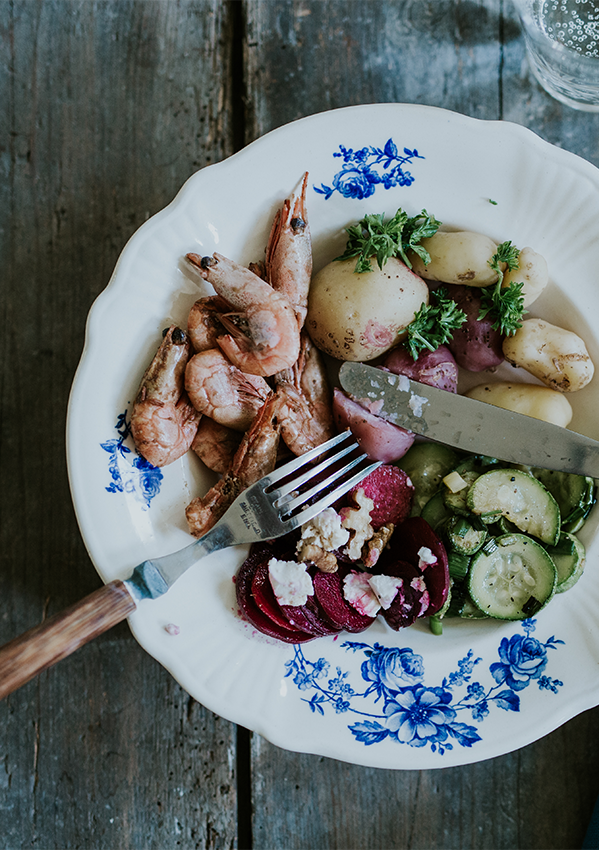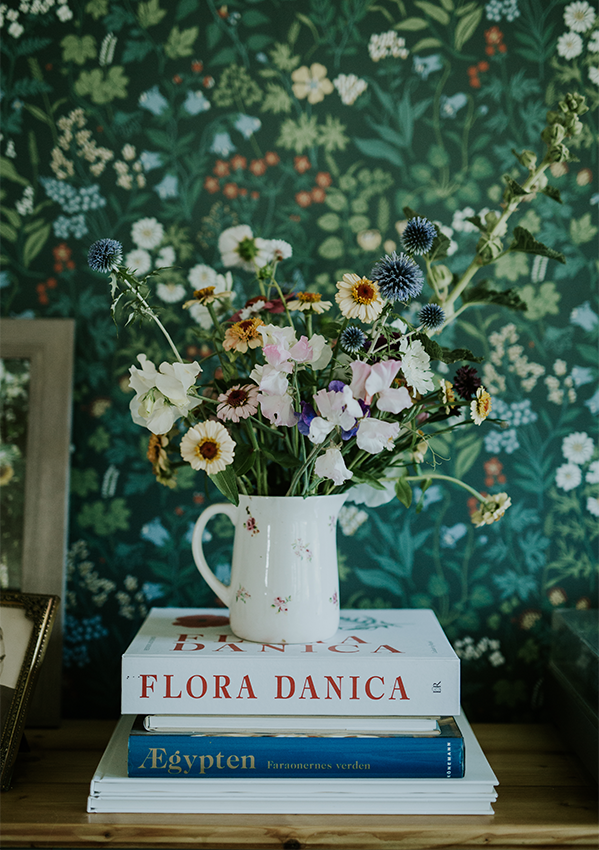












Camilla Jørvad

Öncelikle sizi biraz tanıyalım mı?
İsmim Camilla. Ben kendi kendini yetiştirmiş bir fotoğrafçıyım. Doğa aşığı ve bahçe takıntılıyım. Eşim, iki çocuğum ve bir sürü hayvanla beraber ufak bir Danimarka adası olan Ærø'deki hobi çiftliğimizde yaşıyorum.
Yaşadığınız ada ve oradaki insanlar hakkında neler söyleyebilirsiniz?
Burada anakaradan farklı bir hız var. Ziyaretçiler her zaman 1 saat 15 dakikalık bir feribot yolculuğunun, nefes almak ve yavaşlamak için doğal bir teşvik olduğunu fark ediyor. Böylece bir kez adaya vardığınızda, burada hızlı olmanın bir anlamı olmadığını görüyorsunuz.
Adada çoğunlukla iki tür insan var; ilki adanın yerlileri ve hayatlarının bir noktasında buradan asla ayrılmayacaklarına karar verenler (eğitim ya da iş amaçlı birkaç yıl ayrılıp sonra bir aile kurmak için geri dönenler). İkincisi de buraya taşınmayı sonradan tercih edenler (genellikle genç ebeveynler) çünkü kasıtlı olarak daha yavaş bir yaşamı arıyorlar. Evler nispeten ucuz. Doğa kapınızın hemen dışında ve genellikle tek kazanç yeterli. Uzaktan veya online çalışabilirseniz, feribot yolculuğu işinize engel değil. Ada hayatı, beraberinizde getireceğiniz sorunlar için bir çözüm değil, hatta kendi yarattığı zorluklar bile var. Ancak turist sezonunun dışında kalan sakin, huzurlu zaman ve fiziksel yavaşlık, ruhunuza merhem gibi geliyor.
Yıllardır fotoğrafçılıkla uğraşıyorsunuz, kendi tarzınızı nasıl tanımlarsınız?
Bahsettiğim gibi ben kendi kendimi yetiştirdim. Bu yüzden ilk 2 yıl boyunca yolumu ve sesimi bulmaya çalışırken çok fazla deney yaptım. Hızlı bir şekilde her şeyi basit tutmayı sevdiğimi keşfettim. Geçtiğimiz 10 sene boyunca da böyle yaptım. Örneğin görsellerime asla müdahale ettirmem, rötuş yapmam veya doku eklemem. Fotoğraflarımın, çevremizdeki doğal güzelliği mümkün olduğunca doğru ve gerçek bir şekilde tasvir etmesini ve aktarmasını istiyorum. Çünkü ben de doğal olarak günlük yaşamın güzelliğini arıyorum.
Mevcut yaşam tarzınıza sahip olmak için sizi ne harekete geçirdi? “Sigridsminde” konseptinin arkasındaki anlayışınızı bizimle paylaşabilir misiniz?
Çok kısa bir süre için, 10’lu yaşlarımın sonlarındayken ve bir yıl boyunca Kopenhag'da yaşıyorken, en büyük hayalim bir çevirmen olarak Brüksel'de süslü bir dairede yaşamak ve çalışmaktı. Ancak üniversitedeyken, iş dünyası yerine İngiliz Edebiyatı, tarih, sanat ve kültür yolunu seçtim. İç sesimi dinlediğim için mutluyum çünkü düşününce asla büyük şehirde başarılı olamazdım. Bu adada doğan eşimle beraber çocuklarımızın bizimle aynı bir tür çocukluk yaşamalarını istedik.
Buradaki hayatımızın mevsimsel yönü, yaşlandıkça (daha akıllandıkça) ve bir tüketici olarak alışkanlıklarımızın daha fazla farkına vardıkça yavaş yavaş gelişti. Prensip meselesi olarak başlayan şey bir yaşam biçimi haline geldi. Çünkü enerjimizin, yiyeceğimizin, projelerimizin ve diğer her şeyin, değişen mevsimlerle genişlemesine ve anlaşma yapmasına izin vermek daha doğru hissettirdi. 20'li yaşlarımın çoğu, dünyanın herhangi bir özel yerinde yapılan düğünleri fotoğraflamak için yılda birçok kez ülke çapında ve yurtdışında seyahat ederek geçti. Yoldaki hayat heyecan verici olsa da yavaş yavaş beni tüketmeye başlamıştı. “ev” kelimesi beni kurtarıp karaya oturtan kelime oldu. “Sigridsminde”, artık sadece bizim evimiz değil, aynı zamanda benim iş yerim, oyun alanım, her sabah uyanma sebebim ve kendimi çok da havaya sokmadan söylemek isterim ki “mirasım” olabileceğini de düşünüyorum.
Bahçenizde neler yetiştiriyorsunuz ve yetiştirdikleriniz sizin için her ay tamamen yeterli oluyor mu?
2020 yılı normalden biraz farklı, çünkü tüm mutfak bahçemizi kış bahçesinde yeni bir alana taşıdım ve ilk yarısını henüz bitirdim. Yani bu yıl sadece bezelye, kabak, çilek, marul ve patates gibi toprağa birkaç şey koymak için alanım oldu. Çiçekler arasında yazlık bahçede domates, çalı fasulyesi, kuşkonmaz, ravent ve kabak yetiştiriyorum. Ama şimdi yaban mersini, üç çeşit ahududu, bektaşi üzümü, iki çeşit kırmızı kuş üzümü, siyah kuş üzümü, böğürtlen ve benzeri ile dolu olan bu baharda, yeni meyve bahçemi bitirdim. Oldukça büyük bir meyve bahçemiz var. Nesillerdir burada olup çok eski olan ve bizim on yıl önce taşındığımızda kendi ektiğimiz ağaçlarla dolu. Şu ana dek çok fazla elma, armut, kiraz ve erik yetiştirdik. Kendi başımıza yiyebileceğimiz ve saklayabileceğimizden daha fazla oldukları için, bunların çoğunu hem kendi hayvanlarımızla hem böceklerle hem de vahşi hayatın kendisiyle paylaşıyoruz.
Ancak normal bir yılda, Haziran-Aralık ayları arasında sebzeler, kabuklu ve kabuksuz meyveler ile kendi kendimize yetiyoruz. Kendi tavuklarımızı yetiştiriyoruz, böylece sürekli bir yumurta kaynağımız var ve her zaman dondurucuya bir kuş koyma seçeneğimiz oluyor. Eşim avlanır ve eve düzenli olarak çeşitli kuş ve bazen de geyik getirir. Aynı zamanda otla beslenen serbest menzilli organik et ve yerel olarak yakalanan balıkları satın aldığımız birçok yerel çiftçi ve
balıkçı da mevcut.
En büyük hedefim, yeni mutfak bahçesi tamamlandığında ve poli tünelim bitip çalışmaya başladığında büyüme mevsimimizi yeterli bir şekilde kışa uzatmak. Ne yazık ki iklim değişikliği nedeniyle deniz sıcaklığı kış boyunca oldukça sabit ve sıcak kalıyor. Örnek vermek gerekirse marul yetiştirmek kışın çoğu yaşanmadan zaten mümkün hale geliyor.
Doğa sürprizlerle dolu ve siz vahşi hayatın içerisinde toprakla iç içesiniz. Birçok hikaye biriktirdiğinizden eminiz. Yaşadığınız ev ve habitat içinde olmanın özellikle büyülü hissettirdiği herhangi bir anınız var mı?
Bu ada hakkında, bu dünyadaki diğer pek çok büyülü yere kıyasla özellikle büyülü diyebileceğim bir şey yok. Sürprizlerle dolu dünyamızın, İskoçya'nın, Norveç'in, ABD'nin, İtalya'nın en etkileyici kısımlarından bazılarını görmek için yeterince şanslı oldum ve bu ada doğal güzellik açısından onlarla rekabet edemez. Burada o kadar “gerçek” doğa bile yok, çoğu bölgeyi zaten tarım oluşturuyor. Ama benim yaptığım ve gerçekten hepimizin yapabileceğine inandığım şey, şu anda nerede olursak olalım, önümüzdeki güzelliği bulmak, yaratmak ve takdir etmek. Burada yaşıyorum; çünkü bu eşimin gerçekten yaşamak istediği dünyadaki tek yer ve zaman içinde burada ne olduğuna değer vermeyi öğrendim ve hayalimdeki çevreye olabildiğince yakın bir şey yaratmak ve inşa etmek için çok çalıştım (kelimenin tam anlamıyla!). Benim hayalim, diğer canlılarla yan yana yaşayabileceğimiz ve hepsinin gelişebileceği bir alan yaratmaktan ibaret.
Evdeki atıklarla nasıl başa çıkıyorsunuz?
Bu üzerinde çok konuştuğumuz bir şey. Çocuklarımız da bu konuda ne hissettiğimi ve nedenini tam olarak biliyorlar. Tavuklarımız, kendi yumurta kabukları da dahil olmak üzere mutfak atıklarımızın %90'ını hallediyorlar. Geri dönüşüm için her şey 7 farklı kutuya ayrılmış durumda. Atık malzeme beni her gün rahatsız eden bir şey. Hasat için çok az şeyimiz olan aylarda, mağazadan eve ne kadar plastik getirdiğimizi izlemek beni tam anlamıyla hasta ediyor. Burada organik olan her şey paketli, bu nedenle alışveriş yaparken kendi konteynırlarını ve çantalarını nasıl getireceğinize dair tüm büyük tavsiyeler maalesef kırsal alanlarda kullanılmıyor. Plastik atık veya kimyasallar arasında seçim yapmak beni üzüyor. Bu yüzden tek cevap daha fazla büyümek, daha fazla korumak gibi görünüyor.
Birçok kişi pandemi sırasında eve kapanıp pastoral yaşam tarzına yönelmeye başladı ve bunun sonucunda “Cottagecore” üzerine daha fazla bir merak gelişti. Bu aslında uzun yıllardır sizin yaşam tarzınız. Bunun bir trend olması hakkında ne düşünüyorsunuz? “Cottagecore” estetiği size neyi temsil ediyor?
Anladığım kadarıyla “Cottagecore”, kırsal yaşamın, stilize ve romantize edilmiş mükemmel kontrollü bir versiyonu. Gölgede asılı bir çamaşır iplerinde bembeyaz çarşaflar, ev yapımı ekmekler, küçük kuzular ve çiçekli elbiseler... Her şey her zaman sevimli ve güzel. Bu benim günlük hayatımın tam tersi. Kırsal hayat, bir masal değil. Kelimenin tam anlamıyla kan, ter ve gözyaşından ibaret. İnsanlar genellikle Instagram yayınlarımda rüya gibi bir hayat yaşadığımı söylüyor, ancak birçoğunun aslında bir tavuğun kafasını kesmek istediğinden şüpheliyim. Burada kontrol bende değil ve hiçbir şey kesinlikle mükemmel değil. Hayvanlarla, özellikle de büyüklerle yaşarken, bir şeyler her zaman ters gider. Her gün zor seçimler yapmak için hazırlıklı olmak zorundasınız. Herkes gibi benim de çocuklarımla kavgalarım oluyor ve yine herkes gibi ben de evliliğimin yürümesi için çabalıyorum. Ayrıca bunun bu denli çevrimiçi olması konusunda da tamamen açık değilim. Çünkü bunun gerçekliğini sunmak benim için çok önemli. Bunu mükemmel yapan birçok Instagrammer tanıyorum.
Bazıları bunu mizahi açıdan, bazıları çevresel açıdan ve bazıları da sağlık açısından ele alıyor. Ama hepsi hem inişleri hem de çıkışları temsil etmeyi bir görev biliyorlar. Kırsal hayatı idealize etmek, bence sadece ev sahibi veya küçük bir arsa sahibi olmayı hayal eden tüm insanlar için hayal kırıklığına yol açar. Pandemi, bana gerçekten, dış sorunların herkesin beslendiği toplumumuzda kurulan sistemin kesilmesini tehdit ettiğinde, burada çiftlikte yönettiğimiz yaşamla doğru yolda olduğumuzu, finansal olarak basit bir hayat yaşamanın bize daha fazla seçenek sunduğunu ve kendi kendine yeterliliğin büyük bir hediye olduğunu gösterdi. Bu da bizim için yeterince anlamlı.
Zihin ve beden dengesi bugünlerde özellikle önemli hale geldi. Doğa ile çalışmalarınızın ne tür faydalarını keşfettiniz?
Hem stres hem de depresyonun birkaç turunu ele alan son derece hassas bir kişi olarak, ruh sağlığı ve fiziksel sağlığın, yaşamın her seviyesine bağlı olduğunu kolaylıkla söyleyebilirim. Şu anda bu soruları cevaplarken, burada otururken, yanımdaki pencere sonuna dek açık ve duyabildiğim tek şey ağaçlardaki rüzgarın ve cıvıl cıvıl kuşların sesi (bazen horozumuz tarafından kesintiye uğrasa da). Yaşadığım yerin gürültülü olmamasının benim için bir şifa olduğuna dair şüphe yok. Doğa seslerle dolu olsa da hala tamamen sessizmiş gibi hissettiriyor.
Bahçede fiziksel olarak sıkı çalışmak çok iyi geliyor. Bedenim ne kadar yorgun olursa, günün sonunda kendimi daha iyi hissediyorum. En kötü durumdayken, aklım tükeniyor ve bedenim dinlenemiyor. Fiziksel çalışma, zihnimi açık ve bedenimi yorgun tutuyor. Ve tabii ki, evde yetiştirilmiş ve pişirilmiş yiyecekler çoğumuzun bir mağazada satın alabileceği her şeyden çok daha besleyici. Fastfood ve mikrodalga yemeklerin kolaylığını tamamen anlıyorum (Saf değilim!). Fakat birçok adımdan oluşan yemek yapma sürecinin insanların elinden alınmış olmasının sağlığımız adına büyük bir zarar olduğunu düşünüyorum. Hücrelerinizi gerçekten ihtiyaç duydukları her şeyle dolduran besleyici yiyecekler yediğinizde daha fazla ve daha odaklı çalışabilirsiniz. Bu sayede daha iyi uyursunuz ve yeniden şarj edilirsiniz. Tüm bunların hepsi birbirine bağlı.
Şehirde yaşayanların daha dikkatli yaşamaları için herhangi bir tavsiyeniz var mı?
Evde kendi kendimize uygulayabileceğimiz herhangi bir yöntemi veya tekniği öğrenmekten mutluluk duyarız?
Bazı insanlar “yavaş yaşam”ın bir tür zihin durumu olduğunu düşünüyor. Ama ben bunu tam anlamıyla ve her şeyiyle yaşıyorum. Her gün yavaş hareket etmek için elimden geleni yapıyorum, başsız bir tavuk gibi acele etmiyorum. Koşmayı reddediyorum (gerçek bir koşuya çıkmadığım sürece). Bahçemde çalışırken sık sık durduğum ve etrafıma baktığım, zihnimin dolaşmasına izin verdiğim anları yakalıyorum. Sadece yakın çevremle yeniden bağlantıya geçmek için her yaz ve kış bir ay sosyal medyada aktif olurum. Herkesi sosyal medyayı kullanmada çok kısıtlı olmaya davet ediyorum. Onun sizi kullanmasına, zamanınızı ve hayatınızı çalmasına izin vermeyin. Sam Harris'in dini ve manevi olmayan ancak farkındalığa odaklanan, seslerin ve diğer rahatsız edici faktörlerin içeri girmesine izin veren ve bir huzur anı bulmak için tam bir sessizliğe ihtiyaç duymak yerine onları bırakmayı öğütleyen meditasyon rehberini gerçekten çok seviyorum. Ayrıca çevrenize dikkat etmeye çalışın, gerçekten onları görün. Çoğu zaman, etrafımızda fark ettiğimizden daha fazla güzellik oluyor. Bir bahçeye veya başka bir açık alana erişiminiz yoksa, iç mekan bitkileri dünyası size daima açık. Sadece görsel rahatlama getirmekle kalmaz, aynı zamanda hava kalitemizi de iyileştirir.
Camilla Jørvad | from volume 15
words & interview: İsmail Dağlı
photography: Camilla Jørvad
